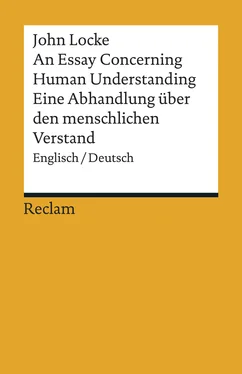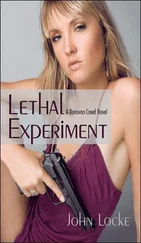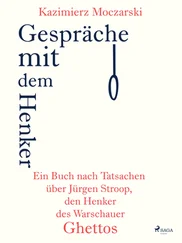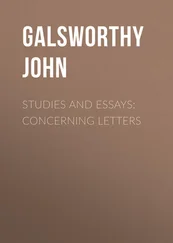[…]
§ 12. If by knowing and assenting to them, when we come to the use of Reason be meant, that this is the time, when they come to be taken notice of by the Mind; and that as soon as Children come to the use of Reason, they come also to know and assent to these Maxims; this also is false, and frivolous. First , It is false. Because it is evident, these Maxims are not in the Mind so early as the use of Reason: and therefore the coming to the use of Reason is falsly assigned, as the time of their Discovery. How many instances of the use of Reason may we observe in Children, a long time before they have any Knowledge of this Maxim, That it is impossible for the same thing to be, and not to be ? and a great part of illiterate People, and Savages, pass many Years, even of their rational Age, without ever thinking on this, and the like general Propositions. […]
[…]
§ 14. But, Secondly , were it true, that the precise time of their being known, and assented to, were, when Men come to the Use of Reason ; neither would that prove them innate. This way of arguing is as frivolous, as the Supposition of it self is [38]false. For by what kind of Logick will it appear, that any Notion is Originally by Nature imprinted in the Mind in its first Constitution, because it comes first to be observed, and assented to, when a Faculty of the Mind, which has quite a distinct Province, begins to exert it self? […] I agree then with these Men of innate Principles, that there is no Knowledge of these general and self-evident Maxims in the Mind, till it comes to the Exercise of Reason: but I deny that the coming to the use of Reason, is the precise time when they are first taken notice of; and, if that were the precise time, I deny that it would prove them innate. […]
§ 15. The Senses at first let in particular Ideas , and furnish the yet empty Cabinet: And the Mind by degrees growing familiar with some of them, they are lodged in the Memory, and Names got to them. Afterwards the Mind proceeding farther, abstracts them, and by Degrees learns the use of general Names. In this manner the Mind comes to be furnish’d with Ideas and Language, the Materials about which to exercise its discursive Faculty: And the use of Reason becomes daily more visible, as these Materials, that give it Employment, increase. But though the having of general Ideas , and the use of general Words and Reason usually grow together; yet, I see not, how this any way proves them innate. The Knowledge of some Truths, I confess, is very early in the Mind; but in a way that shews them not to be innate. For, if we will observe, we shall find it still to be about Ideas , not innate, but acquired: It being [40]about those first, which are imprinted by external Things, with which Infants have earliest to do, and which make the most frequent Impressions on their Senses. In Ideas thus got, the Mind discovers, That some agree, and others differ, probably as soon as it has any use of Memory; as soon as it is able, to retain and perceive distinct Ideas . But whether it be then, or no, this is certain, it does so long before it has the use of Words; or comes to that, which we commonly call the use of Reason . For a Child knows as certainly, before it can speak, the difference between the Ideas of Sweet and Bitter ( i. e. That Sweet is not Bitter) as it knows afterwards (when it comes to speak) That Worm-wood and Sugar-plumbs, are not the same thing.
[…]
§ 17. This Evasion therefore of general Assent, when Men come to the use of Reason, failing as it does, and leaving no difference between those supposed-innate, and other Truths, that are afterwards acquired and learnt, Men have endeavoured to secure an universal Assent to those they call Maxims, by saying, they are generally assented to, as soon as proposed , and the Terms they are propos’d in, understood […]
§ 18. In Answer to this, I demand whether ready assent , given to a Proposition upon first hearing , and understanding the Terms, be a certain mark of an innate Principle? If it be not, such a general assent is in vain urged as a Proof of them: If it be said, that it is a mark of innate, they must then allow all such Propositions to be innate, which are generally assented to as soon as heard, whereby they will find themselves plentifully [42]stored with innate Principles. For upon the same ground ( viz .) of Assent at first hearing and understanding the Terms, That Men would have those Maxims pass for innate, they must also admit several Propositions about Numbers, to be innate: And thus, That One and Two are equal to Three, That Two and Two are equal to Four , and a multitude of other the like Propositions in Numbers, that every Body assents to, at first hearing, and understanding the Terms, must have a place amongst these innate Axioms. Nor is this the Prerogative of Numbers alone, and Propositions made about several of them: But even natural Philosophy, and all the other Sciences afford Propositions, which are sure to meet with Assent, as soon as they are understood. That two Bodies cannot be in the same place , is a Truth, that no Body any more sticks at, than at this Maxim, That it is impossible for the same thing to be, and not to be ; That White is not Black, That a Square is not a Circle, That Yellowness is not Sweetness : These, and a Million of such other Propositions, as many at least, as we have distinct Ideas , every Man in his Wits, at first hearing, and knowing what the Names stand for, must necessarily assent to. If then these Men will be true to their own Rule, and have Assent at first hearing and understanding the Terms , to be a mark of innate, they must allow, not only as many innate Propositions, as Men have distinct Ideas ; but as many as Men can make Propositions, wherein different Ideas are denied one of another. Since every Proposition, wherein one different Idea is denied of another, will as certainly find [44]Assent at first hearing and understanding the Terms, as this general one, It is impossible for the same to be, and not to be ; or that which is the Foundation of it, and is the easier understood of the two, The same is not different : By which Account, they will have Legions of innate Propositions of this one sort, without mentioning any other. But since no Proposition can be innate, unless the Ideas , about which it is, be innate, This will be, to suppose all our Ideas of Colours, Sounds, Tastes, Figures, etc . innate; than which there cannot be any thing more opposite to Reason and Experience. Universal and ready assent, upon hearing and understanding the Terms, is (I grant) a mark of self-evidence: but self-evidence, depending not on innate Impressions, but on something else (as we shall shew hereafter) belongs to several Propositions, which no Body was yet so extravagant, as to pretend to be innate.
§ 19. Nor let it be said, That those more particular self-evident Propositions, which are assented to at first hearing, as, That One and Two are equal to Three; That Green is not Red , etc. are received as the Consequences of those more universal Propositions, which are look’d on as innate Principles: since any one, who will but take the Pains to observe what passes in the Understanding, will certainly find, That these, and the like less general Propositions, are certainly known and firmly assented to, by those, who are utterly ignorant of those more general Maxims; and so, being earlier in the Mind than those (as they are called) first Principles, cannot owe to them the Assent, wherewith they are received at first hearing.
[…]
[46]§ 21. But we have not yet done with assenting to Propositions at first hearing and understanding their Terms ; ’tis fit we first take notice, That this, instead of being a mark, that they are innate, is a proof of the contrary: Since it supposes, that several, who understand and know other things, are ignorant of these Principles, till they are propos’d to them; and that one may be unacquainted with these Truths, till he hears them from others. For if they were innate, What need they be propos’d, in order to gaining assent; when, by being in the Understanding, by a natural and original Impression (if there were any such) they could not but be known before? […]
Читать дальше












